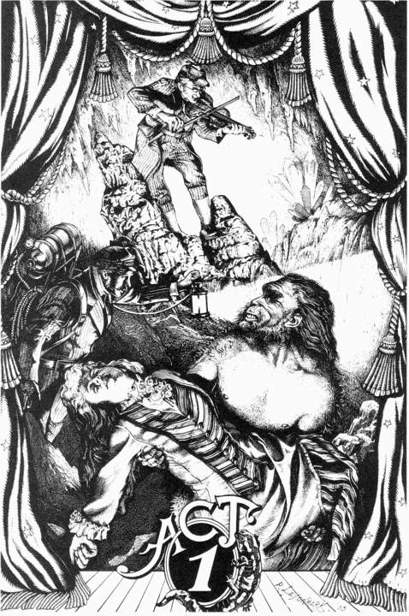Journey Through the Impossible (4 page)
Read Journey Through the Impossible Online
Authors: Jules Verne,Edward Baxter

 erne has selected the most striking incidents of his romantico-
erne has selected the most striking incidents of his romantico-
scientific productions, such as "Doctor Ox," Journey to the
Center of the Earth, From the Earth to the Moon, and Twenty Thousand
Leagues under the Sea.
In a little town in Denmark lives the Widow Traventhal, whose
daughter Eva is betrothed to young George Hatteras. George is a son
of that famous Captain Hatteras whose voyage in search of the North
pole terminated fatally. His friends have always concealed the
parentage: they feared lest the example of the father might tempt the
child. But it is all in vain; no man can escape his destiny. The blood of
the bold navigator courses through his veins; he thirsts after the
unknown. Hatteras lives in the midst of maps and charts and globes,
and in his delirium dreams of exploration such as none other has ever
imagined. He would attempt the impossible.
"Quite mad!" say his fellow-citizens. "Certainly very sick!" reply
Madame and Mademoiselle Traventhal, who immediately send for
Dr. Ox and ask him to prescribe. Now, Dr. Ox is an excellent scientist
by reputation but, instead of administering chloral or bromide of
potassium, he works up the diseased brain of his patient, first, by
revealing to Hatteras his connection with the deceased Arctic explorer; second, by the assurance that he can help Hatteras to realize
his desire.
The doctor is a species of Mephistopheles; and he, too, is in love
with Eva. The savant's scheme is truly diabolical. He administers an
elixir that emancipates the youth from subjection to physical laws that
hamper ordinary human beings, but his real object is to get rid of his
rival by killing him or rendering him incurably mad. In vain does the
organist Volsius try to snatch George from this sinister influence. He
tries music, he tries argument, but he might as well have left both
untried. George persists, and then, with a noble spirit of self-sacrifice,
he assures the disconsolate maiden that he, too, will share the perils
of her lover's peregrinations.
Volsius will protect Hatteras, he swears, in spite of himself, and
this he does in a series of avatars wherein he appears as Professor
Lidenbrock (Act I), Captain Nemo (Act II), Michel Ardan, and a citizen of the Planet Altor (Act III).
The struggle between the doctor and the musician is intended to
illustrate the conflict between good and evil. But Eva is not altogether
satisfied; she fears entrusting Hatteras to Volsius alone, and so she,
too, with her a friend of the family, one Tartelet, the dancing master,
takes a dose of the magic mixture, and in the twinkling of an eye Dr.
Ox, Hatteras, Volsius, Eva, and the dancing master are transported to
the foot of Mount Vesuvius, and there begins the first ballet.
The tourists, whose party is reinforced by a traveler from Denmark, whom they meet at Naples, Monsieur Valdemar by name, begin
their excursions by a visit to the "entrails of the earth" in search of the
"central fire." Three "entrails" are visited in this journey, of which a
fissure in the volcano is the starting point. The first entrail is a rocky
cavern, while the second appears to be made of granite. The third is
represented by a most fantastic subterranean vegetation, with the atmosphere rendered peculiarly luminous, resulting from an underground rivulet of extraordinary light and color. These regions are
inhabited by the Troglodytes, a degenerate class of beings, ugly, but
picturesque, with long hair, mud-tinted faces, and silver hands.
Next step: The harbor of Goa, with Indian pavilions, and in the
background the city and the sea. Here, Monsieur Valdemar, the funny
man, does a monologue expressive of his satisfaction with the "diamond picked up 5,000 feet below the surface of the earth." Then the
Nautilus, a cigar-shaped craft, steams in: the travelers go on board,
and in the eleventh setting are seen seated around the hospitable table
of Captain Nemo-the third incarnation of Volsius. The Nautilus
plunges, and her passengers walk out of their cabins into the magic
city of the Atlantides. The citizens of this realm are rising up in a revolution, and they want a king. Having chosen one of their own, they
are about to crown him when the prophetess of Atlantis plots with Dr.
Ox and Hatteras to make a coup d'etat, which results in the selection
of George and his immediate coronation, all serving as a pretext for
more dancing, more marble staircases, porphyry columns, minarets,
and stage props in general.
For the next part of the journey, the Gun Club, offers nothing
specially interesting or original. The members amuse themselves by
shooting pistols while the big gun is being made ready. A servant
enters, and the Columbiad is prepared. "Gentlemen," he announces,
"will the intending travelers kindly take seats in the shell!" With the
exception of Dr. Ox, the party gets into the projectile and, the scene
changing, the huge mortar. Just as the match is being applied, Monsieur Volsius rushes on the stage and insists on an excursion ticket,
which is kindly granted by the Gun Club's committee. He gets in at
the vent: an explosion is heard, and again the scene shifts to the
planet Altor. The vehicle has reached its destination in safety; and
the occupants are met by Maitre Volsius as an Altorian in a long
robe, to whom Valdemar and Tartelet make a political speech in
explanation of the advantages and disadvantages of parliamentarianism, while their companions admire the architectural beauties of
a planet where a cottage has a golden roof and walls encrusted with
precious stones. Another discovery much impresses the party: the Altorians are favored with two suns-one for the day, the other for
the night.
It is in the marketplace of Altor that the third ballet of the play
takes place. Suddenly, in the midst of mirth and joy, comes a terrible
crash. A "meteoric comet" has struck the festive planet: everything
crumbles away, the clouds gather, the thunder rolls, the lightning
flashes, and Altor becomes a thing of the past. The excursionists
escape the cataclysm. They return to Earth, where, in Andernak
Castle, Hatteras, at first quite insane, recovers his reason, thanks to
his betrothed, whose love triumphs over the jealous hate of the fatal
doctor, after which comes the obligatory apotheosis in three transformations and the curtain falls.
MAIN CHARACTERS
Mme de Traventhal, a wealthy aristocrat living in Andernak Castle.
Her money pays all expenses during the journey.
Eva, daughter of Mme de Traventhal and fiancee of George Hatteras
George, son of Captain Hatteras, the explorer who discovered the
North Pole in journeys and Adventures of Captain Hatteras, by Jules
Verne. George wants to do more than his father: not an "Extraordinary journey," but an "Impossible Journey."
Doctor Ox, scientist and chemist, evil character, from Verne's short
story "Doctor Ox." He mentors George and pushes him to do the
impossible.
Volsius, a good character who becomes Lidenbrock (from Journey to
the Center of the Earth) in Act I, Nemo (from Twenty Thousand
Leagues under the Sea) in Act II, and Michel Ardan (from From the Earth to the Moon and Around the Moon) in Act III. Volsius protects
George and Eva, and fights against Dr. Ox.
Tartelet, friend of Mme de Traventhal and Eva, a comic character in
the play.
Valdemar, Danish citizen and the other comic character. He becomes
a friend of Tartelet.
SECONDARY CHARACTERS
In Andernak:
Niels, servant of Mme de Traventhal
In Naples:
Italian Innkeeper
In Goa:
Jeweller in Goa
First Hindu
Englishman (Captain Anderson)
A naval officer
In Atlantis:
A herald
Ammon (citizen of Atlantis)
Ascalis (citizen of Atlantis)
Electra (a prophetess)
At the Gun Club and at the Columbiad, in Florida:
First group of members of the Gun Club
Second group of members of the Gun Club
Barbicane, president of the Gun Club in Baltimore (from From the
Earth to the Moon and Around the Moon)
An Usher
J.T. Maston, secretary of the Gun Club in Baltimore (from From
the Earth to the Moon and Around the Moon)
Members of the Gun Club
The employee of the telephone company
On the Planet Altor:
First Altorian
Second Altorian

by
Joles Berne
TRANSLATED BY Edward Baxter
